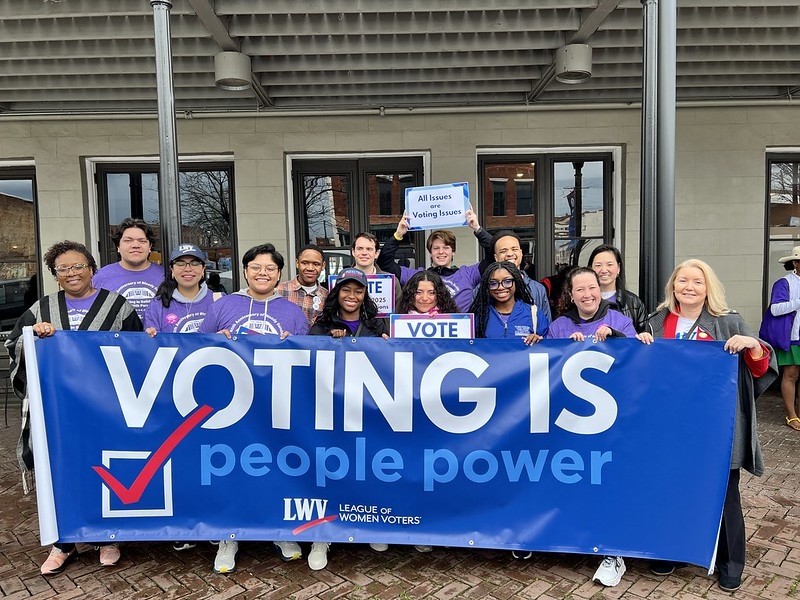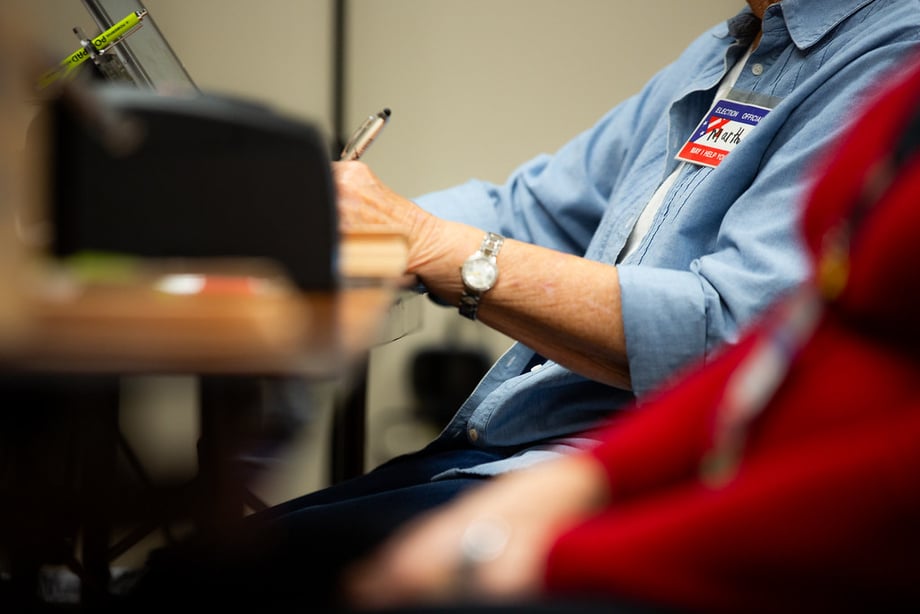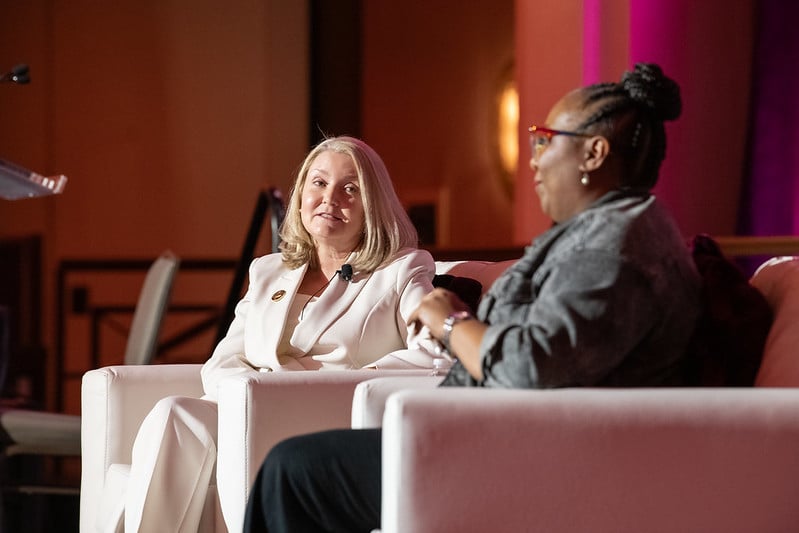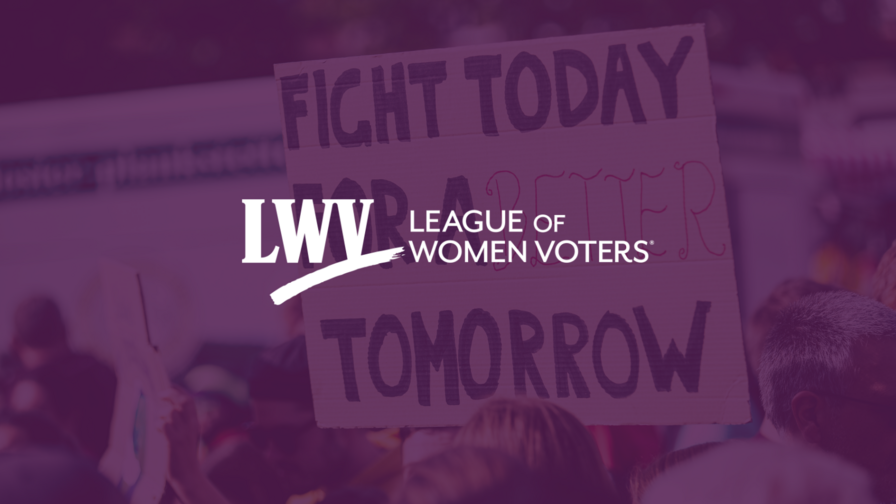Grassroots Activism: How You Can Take Action!
As we witness a barrage of assaults on our democratic processes, institutions, and values, it’s not surprising that many people feel overwhelmed and even frightened. Common reactions to these feelings are fight, flight, freeze, or fawn:
Flight: Some people will avoid or minimize any political engagement;
Freeze: Others feel so overwhelmed and powerless they will shut down, unable to do anything;
Fawn: Fear may drive others to appease or give in to those in power; or
Fight: We must fight back! Anti-democratic actors want us to feel defeated in order to make us compliant and/or immobile. Instead, everyone must commit to doing their part in defense of our democracy.
When we collectively rise up and challenge those in power, we make a difference. That includes you — because you have a voice. You have power.
Stay Updated
Keep up with the League. Receive emails to your inbox!
If you doubt that your grassroots activism can make a difference, consider this: Harvard political scientist Dr. Erica Chenoweth analyzed hundreds of twentieth-century violent revolutions and nonviolent campaigns worldwide. Their research revealed two things: (1) nonviolent tactics are more effective, and (2) achieving sweeping change requires only about 3.5% of the population, and often less, to engage in nonviolent collective grassroots action.
So, what will you do to defend democracy?
In this blog, I provide tips for engaging in some (but certainly not all) common grassroots activist tactics. The strategies are usually not difficult, but they do require initiative, persistence, and courage. Decide what tactics are best for you and take action! As long as you’re doing something, you’re making a difference.
Prepare to Take Action
Get Focused
So much is happening in our world — and in our nation — that it is easy to become overwhelmed. For the sake of your own mental and emotional health, accept the fact that it is simply not possible for one individual to tackle every problem. Choose one or two issues on which to focus your activist efforts. This will allow you to be far more effective.

LWVUS president Dianna Wynn (far right) with League members at the 60th anniversary of the Selma Bridge Crossing
Have faith that many others have chosen to focus on the issues you didn’t personally prioritize. It requires a lot of us to work on different issues to advance democracy, equity, and justice.
Commit to doing your part in this work. Take action on other issues only when you have the bandwidth or are strongly moved to do so.
Stay Informed
You don’t need to be an expert on an issue to be an effective grassroots activist. However, you should be generally informed, especially on the topics you care about most.
Choose credible news sources that consistently report facts accurately. This can be challenging in a world where we are bombarded with mis- and disinformation. Misinformation is the unintentional sharing of inaccurate information, while disinformation is the intentional sharing of false information. When you hear it in conversations or see it online, be resolute in correcting false information – not by arguing on posts where it appears (which increases their visibility), but by instead posting accurate content. And don’t repeat or quote bad information!
As part of the League’s Democracy Truth Project, we provide guidance on how to spot mis- and disinformation and what to do when you see it.
Take Grassroots Action!
People who care about democracy or a particular issue often ask me, “But what can I do that would make a difference?” Major progress in our communities and in our nation is rarely the result of a single person’s actions. Change requires a lot of people to engage in small acts persistently. That’s what grassroots activism is all about.
In answer to the question, “What can I do?" The following are common grassroots activism tactics. Remember, the keys to success are persistence and collective action.
Vote
In a democracy, voting is the most fundamental and arguably the most important action you can take. Commit to voting in every election. State and local races are as consequential as presidential and congressional races. Local and state elected officials regularly make decisions that directly impact the quality of life in your community.

Every election is important, and every vote matters. Go vote and encourage others to do the same!
Check out VOTE411.org, the League’s “one-stop-shop” for nonpartisan election information to learn more about voting in your state.
Contact Your Elected Officials
Your elected officials work for you, regardless of who you voted for. It’s usually easy to find contact information for state and local elected officials. You can use this tool from LWV.
Add your representatives’ information to your cell phone contacts to make it quick and convenient to reach out. You can also use the League’s action alerts to easily email your representatives on important issues, including voting rights.
The following are tips for engaging with your elected officials:
- Focus: Focus on one issue so that your message is clear and developed. You can always call or email again on a different issue;
- Decide on Your Ask: The nature of your message depends on the reason you are contacting the elected official, e.g., urging a specific action, expressing disappointment or appreciation, asking for an explanation, or requesting a meeting;
- Applaud Good Actions: Don’t only contact politicians when you are disappointed or angry. Your elected officials also need to hear from you when you support their actions;
- Meet: Meeting in person to discuss an issue with your elected official is ideal, though not always possible. Getting a meeting is easier when you represent an organization, need help on a very specific matter as a constituent, or have a compelling story to share. It never hurts to ask (and keep asking) for a meeting. If necessary, consider other tactics for having an in-person conversation. For instance, when I’ve suspected my requests for a meeting were being ignored, I’ve waited outside meeting rooms to catch legislators in hallways as they walked back to their office;
- Call: Call your official’s office and ask to speak to the elected official or a staff member working on a particular issue. If you are unable to talk to someone, leave a voice message — and keep calling. The message should include your name and contact information, that you are a constituent, the issue you’re calling about, and your specific request, e.g., vote for, vote against, etc. It can be frustrating to get sent to voicemail. However, your official’s office may be flooded with calls on an issue — which is often an indicator of successful grassroots action;
- Email: Clearly and concisely explain your concern and what you want your elected official to do. As with calls, your email message should focus on one issue. Try to put both the issue and the action into the subject line of your email, e.g., “Vote No on the SAVE Act.” For cybersecurity reasons, don’t expect anyone to open attached documents unless they know you are a trusted source; and
- Attend Town Halls: Some elected officials hold town halls or other events as opportunities to talk to and hear from constituents. Go to these events, ask questions, and express your opinions. To learn about these events, subscribe to elected officials’ newsletters (if they have them), follow their social media pages, or contact their offices. Their newsletters and social media pages are good places to learn about what they’re doing.
Attend Government Meetings — and Speak Up
Much of our government is required to operate with an appropriate level of transparency to ensure that politicians remain accountable to the people. This includes government meetings where the public can attend or listen — and sometimes provide public comment. Your state legislature may have committee hearings that include opportunities to present public comments or submit feedback via online portals. Contact your state legislature to find out.
Local governments generally offer the most opportunities for the public to be heard. Look up the meetings of county commissions, city councils, school boards, zoning commissions, etc., to learn the meeting schedule and see if public comment is on the agenda. If you plan on attending, ensure you know the rules; for example, there is likely a time limit for remarks, and you may need to sign up in advance. If you'd prefer not to speak, attend to support other speakers. A crowd of citizens attending a local government meeting can be very compelling.
Protest
Any of the grassroots activist tactics mentioned in this article can be a form of protest. However, here I focus on protest events such as rallies, marches, strikes, and sit-ins. Protest events can even happen in virtual spaces.
Participating in protests is an invaluable tactic for drawing attention to an issue. The media’s coverage of a protest can spark a larger public discussion of an issue at a local, state, or national level. The more people who participate in a protest, the more likely the media will cover it and the harder it is for politicians to ignore. Protest events also provide important opportunities for like-minded people to be in community with each other, which can further motivate grassroots movements.
Protests I’ve participated in have largely been peaceful and nonviolent, and many were even family-friendly events. However, depending on the circumstances, protesting carries potential risks, especially if the event includes acts of civil disobedience. I was arrested while engaging in civil disobedience during a peaceful protest. While I knew an arrest was likely and did what I could to prepare for it, I nevertheless had to weigh the risks to my personal safety, employment, and finances, among other considerations.
Check out this protest guidance before you go – it's essential to be prepared!
Boycott
You have consumer power. Use it by refusing to shop at stores or to stop purchasing products or services that don’t align with your values.

A boycott is a collective action to pressure a company or organization to change its practices or policies. It is a powerful tactic when well organized and enough people participate. For example, the 1950s boycott of the Montgomery, Alabama bus system, sparked by a courageous act of resistance by Rosa Parks, led to the integration of that city’s bus system.
To be effective, a boycott must engage a lot of people and be sustained as long as necessary. I’ve been boycotting a couple of organizations for many years, and I’ve resumed using the services of others after they changed their policies.
Combine a boycott with other tactics. Email the company to tell them why you are boycotting them. Contact your elected official if appropriate. Use your social media platforms to encourage others to join you in a boycott.
A 2023 Forbes article noted, “There should be no question regarding whether boycotts can actually work — the answer is clearly yes, but there is a caveat: boycotts should be one of many tools in our arsenal for social change.”
Leverage Social Media
Social media platforms are powerful outlets for activism. Follow trusted organizations, thought leaders, and credible news outlets to stay abreast of information and events. Social media is often the best place to learn about protest activities. Use your virtual voice to share information about issues you care about, encourage your friends to take action, and amplify information from credible sources.
If calls and emails to your elected officials are being ignored, try tagging them or posting a message to their social media feed. This makes your complaint or request very public and may get more attention. Recently, I was having difficulty resolving a problem with a government agency. However, after posting on both the agency’s and my elected official’s social media, their staff reached out to me directly the next day.
With that said, in general, I don’t encourage trolling (making inflammatory and/or controversial comments) in response to people with whom you disagree. You are unlikely to get positive results, and your engagement may even feed the algorithms elevating material with which you disagree.
@lwvus Last month, 35 women run orgs joined us in an open letter in the Washington Post to call on our lawmakers to restore and protect our rights. #WomenPowerDemocracy ♬ original sound - paramind
Finally, avoid the pitfall of “slacktivism”. Simply liking and sharing posts is not enough. Leveraging your social media must be combined with other tactics. Call or email your elected officials, and use your social media to encourage others to do the same. Post about why you are boycotting a business, and ask others to join you. Share information about a protest, and let friends know that you’ll meet them there.
Write Letters to the Editor
A letter to the editor of a print or digital publication or to the producers of a broadcast is a potential way to reach a larger audience. Letters are often seen by elected officials. Corporations also monitor their coverage in the media.
A letter is more likely to get published when it responds to a recent news story. Clearly and concisely express your opinion or share how an issue personally impacts you. Ensure you carefully follow the publication’s requirements, such as word limits. Most major publications that accept letters will post instructions on their website and provide an online portal for submitting your letter.
Even if your letter is not published, many letters submitted on the same issue from many people can increase the chances that at least one of those letters is selected. Whether the letter is published or not, share it on your social media.
Join Grassroots Organizations
We are more powerful when we band together. Grassroots political advocacy organizations help us stay informed, provide opportunities for action, and put us in community with others who share our passion.
The best organization for you will depend on several factors, such as the issues you care about and the activist opportunities offered. Join more than one organization! You may be more active with some than others, but your membership helps amplify the influence of their work.
To become a League member, join one of the 700+ state and local Leagues.
Of course, I always encourage people to join the League of Women Voters. Local Leagues across the nation offer a wide range of opportunities to promote voting and to engage in advocacy on important issues. You can also download our digital organizing app, League in Action, which allows anyone to take action directly with just a click of a button.
Get Active in a Political Party
Political parties are an essential component of our political system. While the League of Women Voters is a nonpartisan organization, we encourage voters to be involved in the political process. That can include getting active in your preferred political party. Apart from key leaders, League members are welcome to engage in partisan activities. We just require that members keep their partisan politics separate from their work within the League.
Parties provide opportunities to volunteer, attend political events, learn advocacy skills, engage with people with similar values, and help get candidates elected. You may even be inspired to run for office yourself!
Donate
Nonprofit advocacy organizations depend on the donations of supporters. Grassroots organizations with teams of volunteers need resources to maximize their efforts.
For example, when you donate to the League, your support directly advances our work to protect and defend democracy. More resources allow us to expand our work to protect voting rights, reduce the influence of money in politics, and keep power in the hands of the people.
Support our work empowering voters and defending democracy!
Please support the League’s work at the local, state, and national levels! Nonprofit organizations, including the League, appreciate all donations, large and small.
Self-Care
Self-care is a critical component of activism. Politics can be frustrating and stressful at times, and persistent, ongoing grassroots activism can get tiring. But you must stay in the fight! Therefore, it is essential that you tend to your physical, emotional, and mental well-being.
Use the strategies that work best for you to manage stress and avoid burnout. Watch activist Angela Davis talk about the importance of radical self-care.
Activism itself is also a form of self-care. It is empowering to be in community with others who are in the fight with you and know that you are doing your part. Activism is an antidote to feeling overwhelmed, fearful, or powerless.
Women Power Democracy!
In 2024, the Carnegie Endowment for International Peace published a report titled “On the Front Lines: Women’s Mobilization for Democracy in an Era of Backsliding.” The report observes that women have historically been at the forefront of pro-democracy movements globally and that, specifically in the United States, women are driving pro-democratic mobilization.

Dianna Wynn and CEO Celina Stewart, Esq.
The League of Women Voters has been dedicated to defending democracy and empowering grassroots activists for over a century. We are built for this work!
Now that you have the tools to make your voice heard empower others to do the same. Engage your friends, family, and neighbors in conversations about the issues you care about. Invite them to join you in grassroots actions. Help build a movement! However you choose to get involved, know that it’s everyday people like us, working together, that can bring about change in our communities and our nation. You have the power to make a difference!
The Latest from the League
Last week, the 2024 presidential election was decided. Donald Trump will again become President of the United States. He won both the Electoral College and the popular vote, and when that happens, it means the voters have spoken.
We are proud of the League's work this election to empower voters and protect voting rights. However, we are deeply concerned for the future of women in the United States — as well as LGBTQIA+, Black, brown, and immigrant communities.
With attacks from the recent administration, DEI has been a hot topic recently. In a recent blog, I broke down what DEI really is — and isn’t. In this piece, I’ll describe just a few of the ways DEI impacts us and our democracy. I’ll then share ways you can support it.
"Women Defend Democracy” is the new programmatic focus for the League in 2025 that centers people power and moves our country towards a stronger, multi-racial democracy.
Sign Up For Email
Keep up with the League. Receive emails to your inbox!
Donate to support our work
to empower voters and defend democracy.





